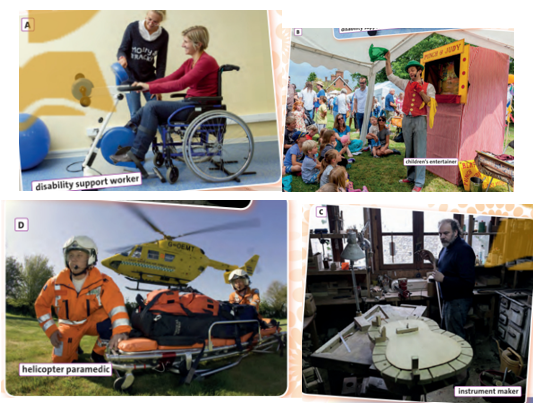1 SPEAKING Why do people go abroad to work? Think of at least three reasons.
(Tại sao mọi người ra nước ngoài làm việc? Hãy nghĩ về ít nhất ba lý do.)
People go abroad to work for various reasons, including
- To seek better job opportunities and higher salaries.
- To gain international work experience and improve language skills.
- To escape political or economic instability in their home country.
(Mọi người ra nước ngoài làm việc vì nhiều lý do, bao gồm
- Để tìm kiếm cơ hội việc làm tốt hơn và mức lương cao hơn.
- Để có được kinh nghiệm làm việc quốc tế và nâng cao kỹ năng ngôn ngữ.
- Để thoát khỏi sự bất ổn chính trị hoặc kinh tế ở nước họ.)

Các bài tập cùng chuyên đề
1 SPEAKING Describe the photos. In your opinion, which is a) the most interesting job and b) the most difficult job? Give reasons.
(Mô tả các bức ảnh. Theo bạn, đâu là a) công việc thú vị nhất và b) công việc khó khăn nhất? Đưa ra lý do.)

7 SPEAKING Work in pairs. Agree on which are the three most important or useful qualities when you are in the following situations. Use the adjectives and nouns from exercise 2, and the phrases from the Look out! box and exercise 6 to help you.
(Làm việc theo cặp. Đồng ý về ba phẩm chất quan trọng hoặc hữu ích nhất khi bạn ở trong các tình huống sau. Sử dụng các tính từ và danh từ trong bài tập 2, và các cụm từ trong Look out! hộp và bài tập 6 để giúp bạn.)
1 At a party
(Tại một bữa tiệc)
2 In a job interview
(Trong một cuộc phỏng vấn xin việc)
3 On a field trip
(Trong một chuyến dã ngoại)
4 In lessons
(Trong tiết học)
A: We think that sociability and ... are useful qualities to have when you're at a party.
B: It's best not to be... when you are...
(Chúng tôi nghĩ rằng tính xã hội và ... là những phẩm chất hữu ích cần có khi bạn dự tiệc.
B: Tốt nhất là đừng... khi bạn...)
6 SPEAKING Work in pairs. Ask and answer about your favourite high flyer. The following cues can help you.
(Làm việc theo cặp. Hỏi và trả lời về người bay cao yêu thích của bạn. Các gợi ý sau đây có thể giúp bạn.)
1 The high flyer you admire
(Người bay cao mà bạn ngưỡng mộ)
2 How you got to know about him/her
(Làm thế nào bạn biết về anh ấy / cô ấy)
3 The reason why you like him/her
(Lý do tại sao bạn thích anh ấy / cô ấy)
4 What you think decides his/her success
(Điều bạn nghĩ quyết định thành công của anh ấy/cô ấy)
1 SPEAKING Work in pairs. What qualities do you think you need to be a good journalist? Why? Discuss the qualities below and your own ideas.
(Làm việc theo cặp. Bạn nghĩ mình cần có những phẩm chất gì để trở thành một nhà báo giỏi? Tại sao? Thảo luận về những phẩm chất dưới đây và ý tưởng của riêng bạn.)

8 SPEAKING In what ways do you think Nellie Bly is a good role model? Give examples from her life to support your opinions. Use the phrases below and your own ideas.
(Theo cách nào bạn nghĩ Nellie Bly là một hình mẫu tốt? Đưa ra ví dụ từ cuộc sống của cô ấy để hỗ trợ ý kiến của bạn. Sử dụng các cụm từ dưới đây và ý tưởng của riêng bạn.)
discover the truth
(khám phá sự thật)
follow her dream
(theo đuổi giấc mơ của cô ấy)
help the poor
(giúp đỡ người nghèo)
make a difference
(tạo nên sự khác biệt)
win the race
(giành chiến thắng cuộc đua)
1 SPEAKING Read the passage. Would you like to take part in such a field trip?
(Đọc đoạn văn. Bạn có muốn tham gia vào một chuyến đi thực tế như vậy?)
Katie moved to Viet Nam after her mother found a job here. Having spent the first few months fitting to the new school, Katie now has an interesting school life. Last week, she joined her school’s field trip to Con Dao island. It involved releasing sea turtles into the sea. Having listened to careful instructions from the scientists, Katie and her friends received little turtles to care for before they took the turtles to the beach. Katie then learned how to release her little turtles to the sea. Though it was a short one, participating in the trip helped Katie make new friends. She loved having done something to protect the wildlife.
7 SPEAKING Work in pairs. Ask and answer the questions and follow-up questions from exercise 6.
(Làm việc theo cặp. Hỏi và trả lời các câu hỏi và câu hỏi tiếp theo từ bài tập 6.)
1 Look at the book cover. What do you think the book is about?
(Nhìn vào bìa sách. Bạn nghĩ cuốn sách nói về điều gì?)

6 SPEAKING Work in pairs. Discuss these questions and report your ideas to the class.
(Làm việc theo cặp. Thảo luận những câu hỏi này và báo cáo ý tưởng của bạn trước lớp.)
1 Do you think it is necessary for pesticides to be banned? Why?
(Theo bạn có cần cấm thuốc xịt cỏ không? Tại sao?)
2 Do you agree with the views Rachel Carson expressed in Silent Spring? Why?/Why not?
(Bạn có đồng ý với quan điểm mà Rachel Carson thể hiện trong Silent Spring không? Tại sao có / tại sao không?)
3 Would you like to be an ecologist? Why? / Why not? If so, what would you most concern yourself about?
(Bạn có muốn trở thành một nhà sinh thái học? Tại sao có? / Tại sao không? Nếu vậy, bạn sẽ quan tâm đến điều gì nhất?)
2 SPEAKING Compare and contrast the photos of people working abroad. What are the people doing?
(So sánh và đối chiếu những bức ảnh của những người làm việc ở nước ngoài. Mọi người đang làm gì?)

1 SPEAKING Work in pairs. Read the definition of vocational. Then think of three jobs for which you would need to do a vocational degree.
(Làm việc theo cặp. Đọc định nghĩa về ‘vocational’. Sau đó, nghĩ về ba công việc mà bạn sẽ cần phải có bằng cấp nghề)
vocational /vǝu'keifǝnl/ adj (of education or training) preparing students for a particular job: Vocational courses such as costume design and catering are becoming very popular.
(vocational /vǝu'keifǝnl/ adj (giáo dục hoặc đào tạo) chuẩn bị cho sinh viên một công việc cụ thể: Các khóa học nghề như thiết kế trang phục và phục vụ ăn uống đang trở nên rất phổ biến.)
2 Read the task and the essay. Do you agree with the writer's general opinion? Why? /Why not?
(Đọc nhiệm vụ và bài luận. Bạn có đồng ý với ý kiến chung của nhà văn? Tại sao tại sao không?)
Students should be encouraged to choose vocational courses at university instead of more traditional courses. Discuss.
(Học sinh nên được khuyến khích chọn các khóa học nghề tại trường đại học thay vì các khóa học truyền thống hơn. Bàn luận.)
Some people maintain that the benefits of vocational courses are greater than those of more traditional ones. That is the question we need to consider. It is certainly true that the workplace is becoming more competitive. A vocational course may be a more direct route into employment compared to traditional courses. It is also undeniable that certain jobs (for example nurse, hairdresser) are only available to people with a vocational qualification. On the other hand, choosing a vocational course means deciding what job you want to do when you are still at school. Many people believe this is too early. How can a teenager know what job is right for him or her? Another problem is that vocational courses only focus on what you need to learn for a particular job. Is it not better for students to explore other interests while at university? On balance, I do not believe that students should choose vocational courses unless they are sure what career they want to follow. It is wiser to opt for a course that really interests you.
Work in groups. Look at the photo and discuss the following point.
(Làm việc nhóm. Nhìn vào bức ảnh và thảo luận về điểm sau đây.)

'It's better to work alone because people in groups spend too much time talking.' Do you agree? Why? Why not?
(Làm việc một mình tốt hơn vì mọi người trong nhóm dành quá nhiều thời gian để nói chuyện.' Bạn có đồng ý không? Tại sao? Tại sao không?)
4. Match 1-5 with a-e to make the start of indirect questions.
(Nối 1-5 với a-e để bắt đầu câu hỏi gián tiếp.)

6. Listen again. Complete the indirect questions with phrases from exercise 4.
(Nghe lại. Hoàn thành các câu hỏi gián tiếp với các cụm từ trong bài tập 4.)
1 _____________if I could ask you some questions.
2 _____________what the job involves?
3 _____________what experience is required.
4 _____________what the salary is.
7. Read the task. Prepare questions about the information below. Think of follow-up questions to find out more details.
(Đọc nhiệm vụ. Chuẩn bị câu hỏi về thông tin dưới đây. Hãy nghĩ đến những câu hỏi tiếp theo để tìm hiểu thêm chi tiết.)
You have applied for a part-time holiday job as a sales assistant in a supermarket. You are going for an interview with the store manager. Prepare questions for the interview about these four points.
• responsibilities
• personal qualities and experience required
• hours of work and salary
• travel expenses.
(Bạn đã nộp đơn xin việc làm bán thời gian trong kỳ nghỉ với vị trí trợ lý bán hàng trong một siêu thị. Bạn sắp có một cuộc phỏng vấn với người quản lý cửa hàng. Chuẩn bị câu hỏi cho cuộc phỏng vấn về bốn điểm này.
• trách nhiệm
• yêu cầu về phẩm chất và kinh nghiệm cá nhân
• giờ làm việc và tiền lương
• chi phí đi lại.)
1 Responsibilities?
________________________________
2 Personal qualities?
________________________________
3 Experience required?
________________________________
4 Hours of work?
________________________________
5 Salary?
________________________________
6 Travel expenses?
________________________________
8. Now do the speaking task above. Use your notes from exercise 7.
(Bây giờ hãy thực hiện nhiệm vụ nói ở trên. Sử dụng ghi chú của bạn từ bài tập 7.)







Danh sách bình luận